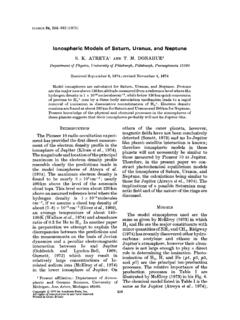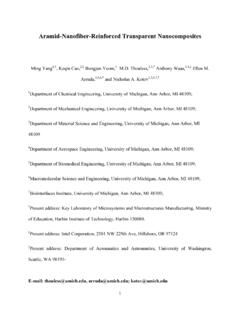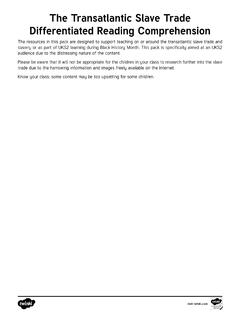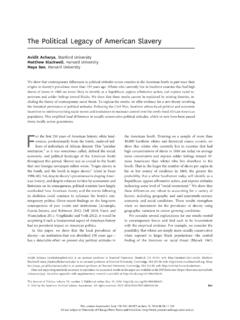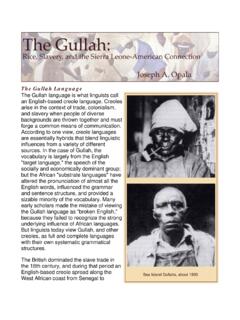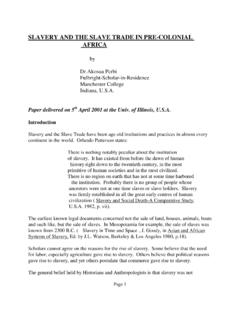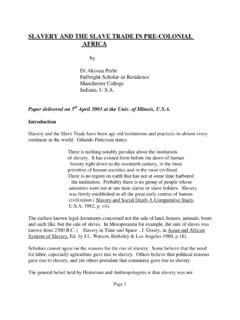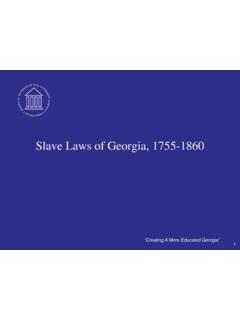Transcription of The Impact of the Slave Trade on African Economies
1 The Impact of the Slave Trade on African EconomiesWarren Whatley and Rob Gillezeau May 23, 2009 Contact InformationWarren Whatley, Department of Economics, University of Michigan, 611 Tappan Street, Ann Arbor, MI, Gillezeau, Department of Economics, University of Michigan, 611 Tappan Street, Ann Arbor, MI, paper has three parts. The first part presents econometric evidence showing that increases in the international demandfor enslaved Africans induced a reallocation of resources in Africa towards Slave production and away from other economicpursuits. In the second part, we use this evidence to help specify a theoretical model of conflict and cooperation in Africabefore and after the Slave Trade . Our goal is to reveal the conditions under which the Slave Trade not only reallocatedresources, but also produced several externalities thought to impede long-term development in Africa.
2 These includeconstraints on the growth of African states, increases in ethnic and social stratification, and a sustained culture of violence. Inthe third part of the paper, we test the predictions of this model against the history of the Asante Empire (present-dayGhana). We find that the model explains Asantes origins and expansion well, including the Asante Alliance, the causes andtiming of territorial expansion, and the southern problem. 1 IntroductionWhat was the Impact of the transatlantic Slave Trade on African Economies and societies? Traditional answersto this question have tended to focus on depopulation. Studies by Manning (1990), and McEvedy and Jones(1978) conclude that the Slave Trade slowed population growth in Africa and may have even reduced theaggregate population between 1700 and 1850.
3 But the causal Impact of population growth on developmentis difficult to assess. Instead, in this paper we focus on the Impact of Slave production, and the associatedexternalities, on the development process broadly conceived. Orlando Patterson (1982) calls the productionof slaves the production of social death. It is a violent process where a person is brought to the brink of We want to thank seminar participants at Michigan, Stanford, Utah, Vermont and UC-Irvine; and participants at the 2008conferences of the Economic History Association, the African Studies Association, the All-UC Conference in Economic History,The American Economics Association, and the NBER summer workshop on the Development of the American Economy1death, spared and then ritualistically put to social death, left to owe the remainder of his life to anotherperson.
4 One would think that centuries of producing social death would leave a mark on social outcomes andinstitutions, some with lasting consequences for development. First of all, Slave raiding disrupts productionand social life in general. Where Slave raiding is frequent, ethnic boundaries and the ability to distinguishinsider from outsider might proliferate as people struggle to manage the risk of being caught. Similarly, anincrease in the profitability of Slave raiding might induce elites to raid for slaves rather than build powerfulstates, further exacerbating the destabilizing effects of Slave widespread was Slave production in Africa? It is impossible to know with any degree of confidence,but we venture a guess. Between the 16th and 19th centuries more than 13 million slaves were produced inAfrica and transported across the Atlantic.
5 77 percent of these slaves ( million) were produced along theWest and West Central coasts of Africa during the 150 years between 1701 and 1700, the estimatedpopulation in this region of Africa was 28 million people (McEvedy and Jones, 1978, pp. 241-249). If theaverage life span was 30 years, then the million slaves were produced over five lifetimes. That yields slaves produced per lifetime, or percent of the total population. If we take into account collateraldamage then the probability of being a victim of Slave production increases further. Slave producers killedand injured others to capture their slaves. Captives died during the long trek to the coast, in the holdingpens along the coast, and during the Middle Passage. And many captives remained in Africa. The physicaland social deaths needed to produce 13 million Slave exports could have easily reached twice that believe it is appropriate to characterize this situation as a reign of terror.
6 What Impact did this production of social death have on Africa? We are surprised there is not alarger economic literature on this the violence continuous and wide-spread, or was it sporadicand confined? Did Slave production encourage state growth, or did it impede it? Did it increase socialstratification and social conflict, or did it encourage defensive co-operation and coalition-building? Was theimpact on Africa temporary and fleeting or did it persist for a long period of time? Finally, does seeing thisperiod as a reign of terror help us understand the path of development in Africa since then? These are thequestions that we begin to address in this have no illusions of answering these complex questions in their entirety. Rather, we have two modestbut important goals in mind.
7 First, we wish to contribute to the empirical evidence that suggests that the1 All Slave Trade quantities are calculated from theTransatlantic Slave Trade Databaseat experiences and observations of Olauda Equiano are instructive. Equiano was born and raised in Igboland behindthe Bight of Biafra (southeast Nigeria). He was captured sometime in the 1760s, later became a leading figure in the Britishabolition movement and wrote the narrative of his life. In it, he recounts two attempts to capture him. The second attemptwas successful. He also remembers frequent battles in the common fields where neighboring villages would fight and captureeach other on a regular basis (Equiano, 1995, pp. 37-48).3An important but overlooked article is David Eltis (1990). Eltis uses heights of Yoruba captives as a measure of Yorubawelfare and finds that for every increase in Slave departures (exports) of 1,000, mean heights of the birth cohort declined bymore than one fifth of a centimeter (p.)
8 519). 2slave Trade actually altered the path of development of African Economies . Nathan Nunn (2008) is the onlystudy that we are aware of that addresses this question empirically. We contribute to this line of research byconducting a direct test, one that does not rely on the assumption that African ethno-linguistic classificationsare exogenous and unchanging. We ask: Did changes in the level of demand for enslaved Africans alter theallocation of African resources, broadly conceived, away from competing uses and towards the capture andtrade of people? If the international demand for enslaved Africans did not influence resource allocationwithin Africa then it is hard to imagine the international Slave Trade altering African paths of find, however, that the international Slave Trade did alter resource allocation in Africa.
9 As the foreigndemand for enslaved Africans increased, Africans responded by capturing and exporting more people. Wecall this a situation of effective demand, in the sense that the international demand for enslaved Africanseffectively altered the direction of economic activity in focusing on effective demand we do not mean to argue that external events caused African do we mean to deny that internal African dynamics were part of the demand as exogenous because Africans Slave producers were price takers and we want to assess theirresponses to changes in price. The relative strength of supply (internal) and demand (external) in determin-ing the nature and extent of the African response is an empirical question. In fact, as we shall see in thispaper, the necessary condition for external demand to have an Impact on Africa is that the supply curve bepositively sloped.
10 In other words, in order for external factors to have had an Impact on African Economies ,Africans must have responded to the external stimulus. This is what Patrick Manning (1983) refers to as Africa engaged. The second goal of the paper is to trace out the Impact of effective demand on the structure of Africaneconomies and societies. When the international demand for enslaved African rises it essentially increasesthe value of people in Trade relative to their value in production. The very first resource reallocation is thedevotion of more resources towards uprooting people. In other words, there is an increase in the economicreturns to Slave raiding. We develop a simple model of cooperation and conflict between nations and villagesin order to trace out the Impact of effective demand on several institutions thought to influence economicdevelopment.






